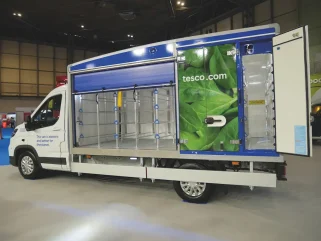
The LCV market has seen its biggest boost over the past decade or so with the growth of online retail. It’s easy to think of this in terms of parcel deliveries by standard panel vans but a large proportion is also accounted for by home grocery deliveries, either by own-account operators in the form of the big-name supermarkets or by independent contractors. All of them deliver perishables, with refrigerated transport being central to maintaining the cold chain in distribution.
The previous key period in conversion history was that of approval, where everything from panel van internal racking, to chassis-cab dropside and tipper bodies, came under original equipment manufacturer (or OEM) approval schemes. Good for both the aftermarket body builder and chassis-maker alike, and so it is with the refrigerated sector.
One such company is CoolKit, twice a winner of What Van?’s Converter of the Year Award, which supplies its conversions onto most van makes. There is an emphasis on lightweight materials, therefore optimising productivity through less payload penalty, superior insulation minimising the need for cooling power by maximising thermal integrity and across the board manufacturer (OEM) accreditation by respecting the guidance and the prohibitions of the OEM van being modified. This means its equipment and conversion is warranted to match the base vehicle’s warranty.
CoolKit in turn works with a number of refrigerator unit suppliers to suit application, or operator preference, particularly important with new vehicles joining an existing fleet for commonality in service and repair. It deals with the biggest names in the sector, including GAH, Hubbard (Zanotti), Carrier Transicold, Thermo King and Webasto.
A hardwearing, reinforced, waterproof easy-clean interior is essential for food hygiene requirements with a choice of floor surface finishes in reinforced polypropylene that weighs only a fraction of traditional timber reinforcement and as a bonus won’t rot, while full-width metal tread plates at each entrance minimise wear. The extruded polystyrene (XPS) insulation provides outstanding thermal performance. Options available include slab doors, drainage points and mid-bulkheads to separate different goods, with electrical options including LED lighting, data recording and telemetry to confirm continuous temperature and condition requirements. For peace of mind, the company also offers its own mobile engineering team providing discounted service, maintenance and repair packages when chosen at the point of order.
The company recently announced that it has been recognised by Ford Motor Company as one of its preferred Ford Pro Convertors. The Ford Pro Convertor Agreement is entered into with convertors that are acknowledged by Ford to be delivering the highest quality products and supplying converted vehicles that are expected to improve customer satisfaction and productivity.
CoolKit gained its recognition after careful inspection by Ford of its engineering capability, design and build process controls, and quality control procedures. Commenting on the certification, Daniel Miller, CoolKit’s managing director, said: “Being designated as a Ford Pro Convertor is a great opportunity to build further on our relationship with Ford. It’s also a highly sought after seal of approval endorsing the quality of our engineering and manufacturing, which we are very proud of.”
It is this comprehensive approach that has also made Vantastec one of the UK leaders in the field and allowed it to deal with recent events well.
“In our opinion, 2024 has seen the refrigerated van industry finally get closer to its pre-pandemic state,” says Vantastec’s Ross Dawson.
“The overall demand for vehicles was so high throughout and after lockdown that it’s difficult to distinguish how much of an impact the growth in online retail and home deliveries had. Of course, we did have a few enquiries from businesses who had started a delivery service because of the pandemic, but it was such a hectic period for our industry as new vans were in short supply. Thankfully, we put our necks on the line and committed to ordering large quantities of stock well in advance. This meant we had plenty of stock to cater to the high demand and we’re already having clients who we acquired during this time contact us for their next vehicles,” he explains.
“Now, for the first time since early 2020, vehicles are easily accessible. Retailers who aren’t proactive and have been complacent the last four years are being left behind, whilst 2023 was quite difficult, with interest rates in turmoil and manufacturers hiking van prices. Things are looking more promising now, though. One major hurdle we’re to face in the future is with the ZEV mandate and whether that’ll have a trickle-down effect on converters such as ourselves.
“We order vehicles directly from the manufacturers in bulk. So far, only one has enforced minimum order quantities for BEVs and PHEVs to help them meet their quotas. It’ll be interesting to see if more manufacturers follow suit the closer we get to 2035,” he adds. “One current innovation that’s piqued our interest is the emergence of fuel cell-powered vehicles. The technology is promising and the workflow seems, in theory, more practical than BEVs. Wales and West Utilities’ recent trial success shows that FCEVs can be a viable option for some fleets. We’ve even researched and developed a hydrogen power unit to install in a host of van conversions – not just refrigeration. The product is currently on trial with Monmouthshire Council as part of their ‘Monmouthshire Meals programme’.
The automotive world is so vast that there’s no one solution to all problems. BEVs aren’t the definitive answer – but that doesn’t mean they don’t have their purpose. For cars and even smaller-sized vans, they can be great. We think the sector will embrace a mix of emission-free solutions that will each cater to different needs,” says Dawson.
As for the current LCV sector’s move to BEVs, Dawson takes a pragmatic view.
“Innovations are being made within the transport refrigeration sector to adopt battery-powered solutions, both in the vehicles themselves as well as the refrigeration systems we install. However, in our experience, uptake from customers is lagging behind. A fair few city-based companies have bought smaller to medium-sized electric fridge vans from us, but the vast majority of enquiries we get are still on regular diesel vehicles. At this stage, they’re much cheaper and are still compliant with CAZ and ULEZ restrictions. Unless a business is actively trying to reduce their carbon footprint, most of our customers haven’t really needed to switch to EVs yet,” he admits.
“The electric refrigeration units we use run on batteries that are completely independent to the vehicle and charged separately. So, in theory, they bear little burden on the electric vans they’re installed on. The only issue is the additional weight they add – which may affect the range of an EV. The only way to combat this is by making the refrigeration units lighter.
“So more powerful solutions are needed, particularly for larger vehicles,” concludes Dawson.
Cool choices
Finding the right refrigerated conversion for you is not easy, so assess exactly what you need. Firstly, do you require a freezer van or merely a refrigerated one? The cost differs considerably but the freezer van offers more flexibility; once you have a Type-A chilled van, trying to move into Type-C frozen transport might prove costly. Consider whether converting your existing large van is worthwhile if a smaller ready-built fridge van would be more cost-effective. Converting one van is labour-intensive; about half the cost will be the labour – compare that with companies producing units en masse. Your existing van may require considerable remedial work and additional electrical systems too. Consider the effect on payload also. A small van may not be productive if a large chunk of its payload is lost in the conversion; likewise, the cost of a system to chill the volume of an LWB Hi-roof 3.5-tonner requires a high workload to justify it. In the short term, renting or leasing a refrigerated van might be the most financially secure option, particularly if this is a move into a new area of business. Have you fully assessed the amount of work available?





